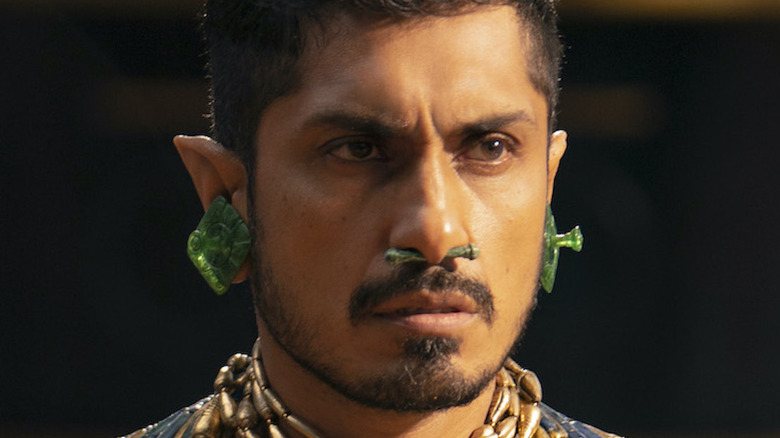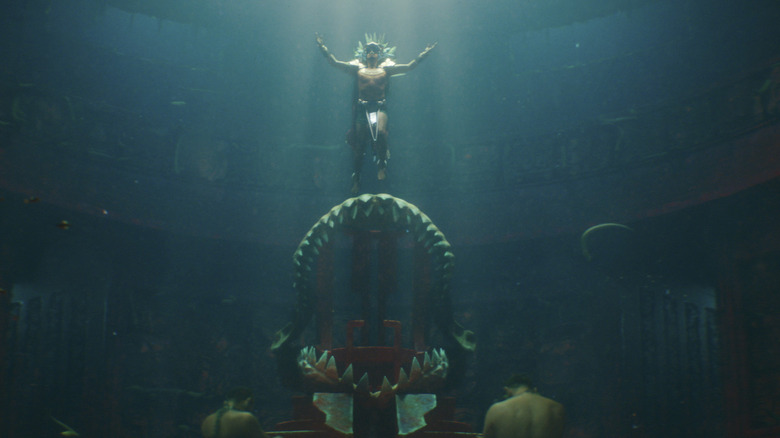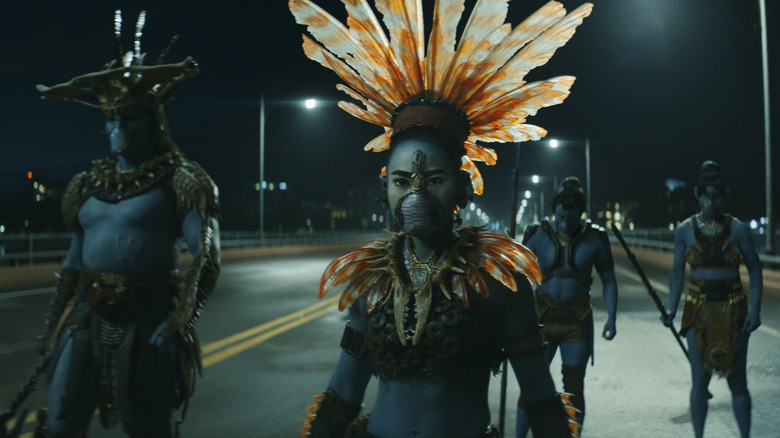Black Panther: Wakanda Forever Producer Nate Moore Discusses Bringing Namor To The MCU - Exclusive
Namor was one of Marvel Comics' very first heroes, having debuted way back in 1939 in "Marvel Comics" #1. More recently, however, the comic version of the so-called Sub-Mariner has become an antagonist to the fictional African nation of Wakanda, and it's this ruthless side of the character that is on display when Namor (Tenoch Huerta) makes his Marvel Cinematic Universe debut in "Black Panther: Wakanda Forever."
However, Namor is far from a one-dimensional villain. His desire to protect his people in the underwater realm of Talokan against the surface world makes his actions understandable. Plus, Talokan's isolationist policies make it a fascinating parallel to the Wakanda of the first "Black Panther," before its king, T'Challa, revealed the fabulous wealth and resources of his country to the world.
While certain parts of the plot of "Wakanda Forever" necessarily changed after the tragic passing of Chadwick Boseman and the decision to have the actor's fate mirrored by his character, according to producer Nate Moore, co-writer and director Ryan Coogler always planned to include Namor in the second "Black Panther" film. "Wakanda Forever" establishes Namor's kingdom as an intriguing place unlike anything previously seen in the MCU.
In an exclusive conversation with Looper, Moore explained why Namor was the right antagonist for the film, described the decisions that went into depicting the Indigineous Mayan culture of the Talokans on screen, and teased whether we'll see Namor and his people in the MCU again.
'Namor and Talokan [are] a really good foil to Wakanda'
Moore noted that Coogler's desire to include Namor and his underwater kingdom in "Wakanda Forever" arose from the ideas he wanted to explore through the film. "Thematically, Ryan continues to be interested in the themes of colonization and how that affects people," Moore shared. "By anchoring Namor and the Talokan people in the legacy of Mayan culture, both past and present, he was able to tell a story, ... with [co-writer] Joe Robert Cole, that juxtaposed Wakanda, a nation that had never been colonized, with the Talokan people, a nation that had fled colonization to such an extreme that they had to build an underwater kingdom to remain free.
"That thematically makes Namor and Talokan a really good foil to Wakanda because their experiences are so different," Moore added. "The way they look at the world is different. But their goals are the same, which is to do the best by the people that they rule. It seemed like the right story to tell."
Bringing a 'rich' culture to the big screen
That focus on colonization, Moore observed, also informed the filmmakers' decision to root the city of Talokan in Indigenous Mayan culture. "It was... thematically, what cultures had experienced this brush with colonization?" he reflected. "There's probably more [such cultures] than we all want to think about, but the Mayan culture is incredibly rich, both visually [and] culturally. From a linguistic standpoint, the characters in the film are speaking Yucatec Mayan."
Moore said that the goal in depicting Talokan was to ensure "it does feel like a love letter to Mayan and Mesoamerican culture, the same way that Wakanda, I would argue, feels like a love letter to the African cultures that inspired it. You want both of those things to be equally rich because it's not about importance, but whenever you're dealing with real cultures, it's our job as storytellers to portray them in a way that feels authentic."
Luckily, for those who come away from "Wakanda Forever" wanting to see more of Talokan, Moore confirmed there are plans to include Namor and his watery world in future MCU projects. "There [are] certainly more stories to tell in the world of Talokan," Moore revealed, "so this will not be the last time you see them or Namor."
"Black Panther: Wakanda Forever" is now playing exclusively in theaters.


